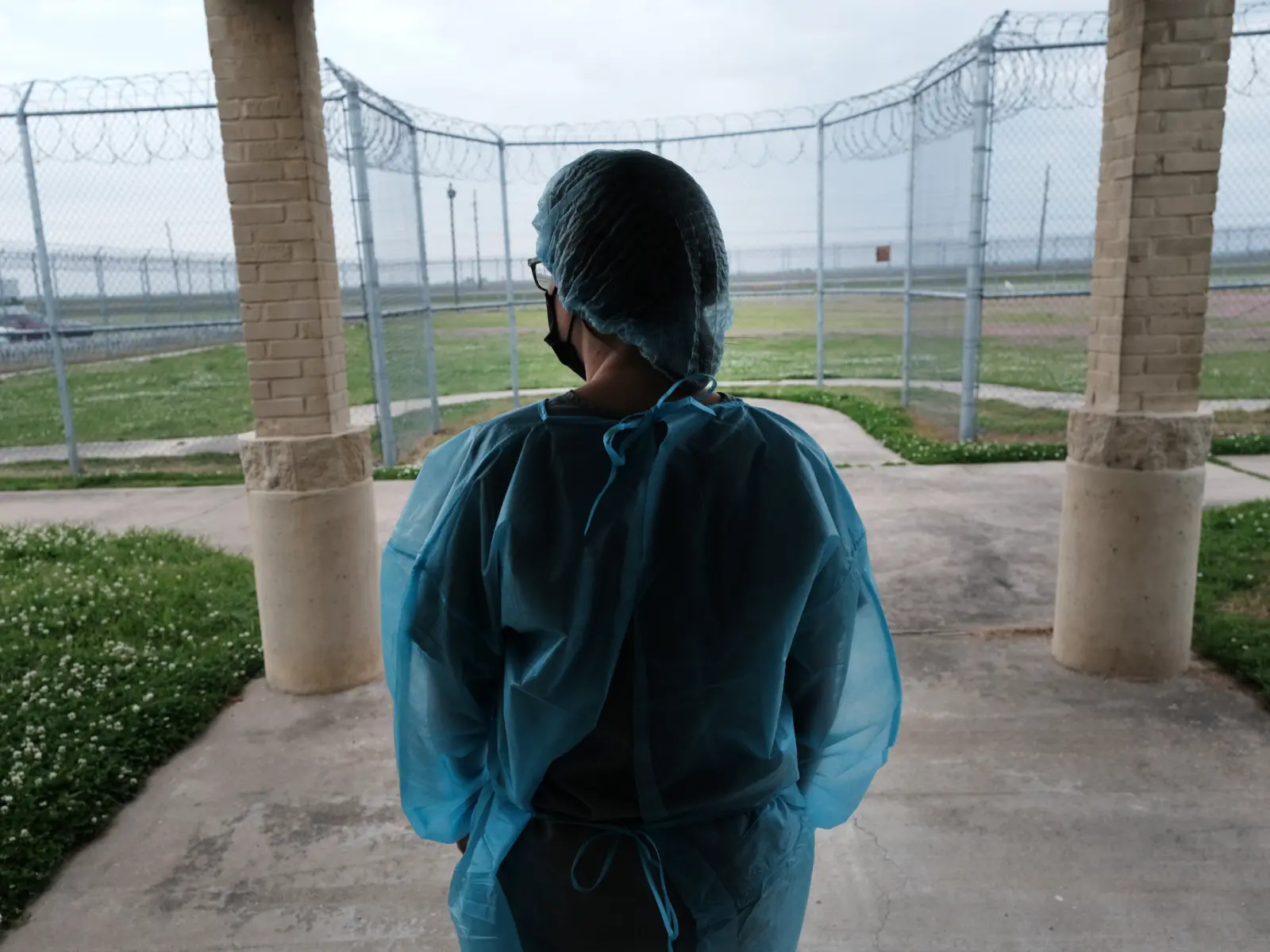Sheriffs are uniquely positioned to respond to community needs. As elected leaders, they are empowered to set policy and to implement it. Unlike municipal law enforcement, they are less bound by city-based decision-making. When functioning well, they can act unilaterally and decisively to address problems they see.
For Sheriff Charmaine McGuffey of Hamilton County, Ohio, that has meant the freedom to focus on criminal justice reform.
“I have learned that what makes citizens feel safe in their neighborhoods is when they feel heard, when they know there is a path for them to connect to law enforcement in a meaningful way,” she says.
Before McGuffey took office, she recalls, the culture and chain of command in Hamilton County was breaking down. Deputies used force too frequently. Women were treated poorly, both those within the sheriff’s office and those incarcerated in the county jail. No one was held accountable.
McGuffey strengthened the chain of command and fired deputies who used excessive force or were abusive to women, minorities, and incarcerated people. She also took measures to build community trust. Today, deputies attend community meetings, not only reporting crime stats but providing their personal cell phone numbers, explaining their work, and taking actions to address community concerns.
The office has also brought together service providers to meet the needs of people incarcerated in the county jail who are experiencing mental and behavioral health issues. McGuffey has created special groups for veterans and women struggling with heroin addiction, providing peer mentoring, yoga, and art therapy.
“Mental health is a huge issue for jails,” McGuffey says. “We continue to find ways to do wraparound care, so that when people get out, they have somebody to connect to.”
Today, a growing movement of forward-thinking sheriffs like McGuffey is seeking to redefine the role in ways that make their communities safer and fairer — and avoid the overreaches of the past. From Ohio to Massachusetts, Michigan, North Carolina, and beyond, a number of sheriffs are implementing similar approaches, reforming their offices to be more just while also improving community safety. Experts say their actions could be the beginning of a sea change.
“These sheriffs are really thoughtful about presenting a different vision of the role,” says Marc Krupanski, director of criminal justice at Arnold Ventures (AV). “They’re implementing new ideas about how we can move forward community safety while at the same time reducing racial disparity, decreasing use of force, creating accountability, and providing community-based services.”
“An opportunity to make things better”
In Massachusetts, sheriff offices are chiefly responsible for running county jails. In Bristol County, Sheriff Paul Heroux, who has a long history of running correctional facilities, has taken a reform mindset to administering the jurisdiction’s jail system, which incarcerates 700 people and employs 600 staff. Prior to his taking office, Heroux says, the jail’s suicide rate was three times the national average. Facilities were old and outmoded, and the reentry unit had too few employees, which caused major problems for incarcerated people and their families.
“Sheriffs have tremendous power,” Heroux says. “I have an opportunity to make things better by improving the conditions that incarcerated people experience, so that they do better when they go back into society, as well as improving the conditions for employees.”
I have an opportunity to make things better by improving the conditions that incarcerated people experience, so that they do better when they go back into society.Paul Heroux sheriff in Bristol County, Massachusetts
Heroux brought in outside evaluators and implemented their recommendations. That included closing facilities that were old and unsafe and rehabbing others, as well as revising the staffing plan so that the jails now run better. The sheriff’s office also improved pay and expanded the stress unit in addition to implementing training on implicit bias, de-escalation, dealing with mental illness, and duty to intervene.
Other important changes provide support to people preparing to reenter the community. The office has scaled up its staffing and services that help provide post-release housing, health care, employment placement, and other needs such as getting state identification and transportation to the place they will sleep the first night of release. Heroux has also expanded access to mental and behavioral health treatment, including medication-assisted treatment for opioid use disorder.
“These changes will help reduce recidivism, but they do something more basic too,” Heroux says. “They show people that this government that’s locking them up is also trying to get them back on their feet.”
“Real police work is about establishing relationships”
Sheriff Jerry Clayton of Washtenaw County, Michigan, came into his role determined to change the culture of the office. He grew up in the organization, starting out as a front-line deputy. But when he was recruited to run for sheriff, the office was facing serious challenges, including a federal indictment for the wrongful death of a local Black resident. In general, Clayton says, Black communities did not feel as though their lives were valued by the sheriff’s office.
Through his work, Clayton aims to foster not just greater community safety but improvements in the community as a whole.
“We’ve been chasing the wrong thing,” Clayton says. “We’ve been chasing public safety. What if our first inclination was to go after community wellness?”
Under his watch, the office has rewritten its use-of-force policies several times to increase accountability for deputies and has invested in body-worn cameras. It has changed its pursuit policy to improve safety for deputies and community members. The office has also increased diversion efforts, launching a Law Enforcement Assisted Diversion program to decrease arrests for minor offenses.
Clayton is also devoted to community engagement. He hired a certified social worker to build relationships with community members and provide treatment. His office also hires people who are formerly justice-involved to engage in community outreach and violence intervention programs. And Clayton oversaw the launch of a group that supports mothers who have children in the justice system.
Recently, the office launched a new data dashboard that informs community members of police activity — which eventually will include information on corrections, substance use incidents, and traffic events as well.
“It’s not just a program where I’ve got some officers out doing picnics in the park, and the other officers are out there doing ‘real police work,’” Clayton explains. “Real police work is about establishing relationships.”
“The time was right”
The job of a sheriff is also about ensuring fair treatment of people across racial lines. That’s an ideal that drives Sheriff Clarence Birkhead of Durham County, North Carolina.
“We see disparate treatment in all jurisdictions, and also in Durham,” Birkhead says. “Neighborhoods felt they were being over-policed. Being a Black man, and now a Black sheriff, I felt the time was right in our nation to do better.”
Birkhead, who has served in law enforcement for 39 years, took office with a determination to flip the script. He created an office of community engagement whose main focus was staying connected to all communities, including the communities of color that are disproportionately affected by violent crime. That effort led to the creation of a community advisory board through which representatives from community organizations, faith groups, and civic clubs meet with the sheriff’s staff quarterly to resolve community concerns, advise the sheriff on improving community trust with law enforcement, and learn about law enforcement initiatives.
“It’s incumbent on all these community members to come to the table and talk about law enforcement and public safety in a holistic manner, not just talk to the sheriff when some egregious act has occurred,” Birkhead says. “I want to change the paradigm of how we engage one another.”
It’s incumbent on all these community members to come to the table and talk about law enforcement and public safety in a holistic manner.Clarence Birkhead sheriff in Durham County, North Carolina
Under Birkhead, the office implemented anti-bias training, increased recruiting of women and minorities, and retrained deputies on use of force. Following the murder of George Floyd, he revised policies to ban chokeholds, backing that up with training and creating consequences for problem deputies.
“It’s all about changing the culture of a law enforcement agency and creating a new expectation,” he explains.
Neighboring Mecklenburg County, North Carolina, has also changed the culture of the sheriff’s office. Sheriff Garry McFadden wants to bridge the gap with communities of color and build partnerships.
One policy he has implemented concerns traffic enforcement. Deputies no longer stop and ticket drivers for equipment violations (like a broken taillight) — only for moving violations that impact traffic safety (like speeding). The change recognizes that wrongful use of force frequently begins with routine traffic stops. Today, instead of ticketing drivers for equipment violations, deputies give them a gift card to a local auto shop to help them get their car fixed.
“That is going to help our citizens trust us,” McFadden says.
The office also emphasizes community engagement. McFadden created a unit with a sergeant, a major, and eight deputies devoted to working full-time with communities, often conducting as many as three events a day — everything from taking kids to a big box store and giving them a $200 gift card to providing adults with holiday gifts for their kids to handing out free basketballs to youth during the summer.
Additionally, McFadden has created initiatives to help unhoused neighbors of Mecklenburg County. He asks that deputies introduce themselves to people who are unhoused, and he has established partnerships with local businesses to provide essentials like food, towels, and even mobile showers. The office also works with a pharmacy to provide them vaccinations for flu and COVID-19.
“Who do they see giving them showers? The sheriff. Who gives them chicken biscuits? Who gives them a vaccination? The sheriff,” McFadden says. “That is how you build bridges in the community.”
“Completely new ideas”
In September 2023, AV hosted a meeting in Washington, D.C., that brought together these and other forward-thinking sheriffs from across the country. The meeting also included academics and district attorneys, with the goal of sharing ideas among leading thinkers and law enforcement representatives on how to make the office of the sheriff — and the criminal justice system more broadly — work better for all involved.
For Heroux, the convening was a useful opportunity to refine ideas, discuss issues like budgeting, and hash out disagreements in the field.
“Sometimes you come across completely new ideas,” he said.
Other sheriffs agreed. McGuffey, for example, said she heard a good suggestion to connect with African American churches and update them about the work of the sheriff’s office. She is working to implement that idea in her community. Birkhead also noted that it was helpful to meet and share ideas with other reform-oriented sheriffs on how to improve delivery of medication-assisted treatment, reduce gun violence, and increase community engagement. He continues such efforts locally in North Carolina.
“I was deeply honored and humbled to be in a room with like-minded people who are really striving to make a difference in criminal justice,” Birkhead says. “To be there with academics and other sheriffs, and to have such a high-level conversation, was very refreshing.”




















